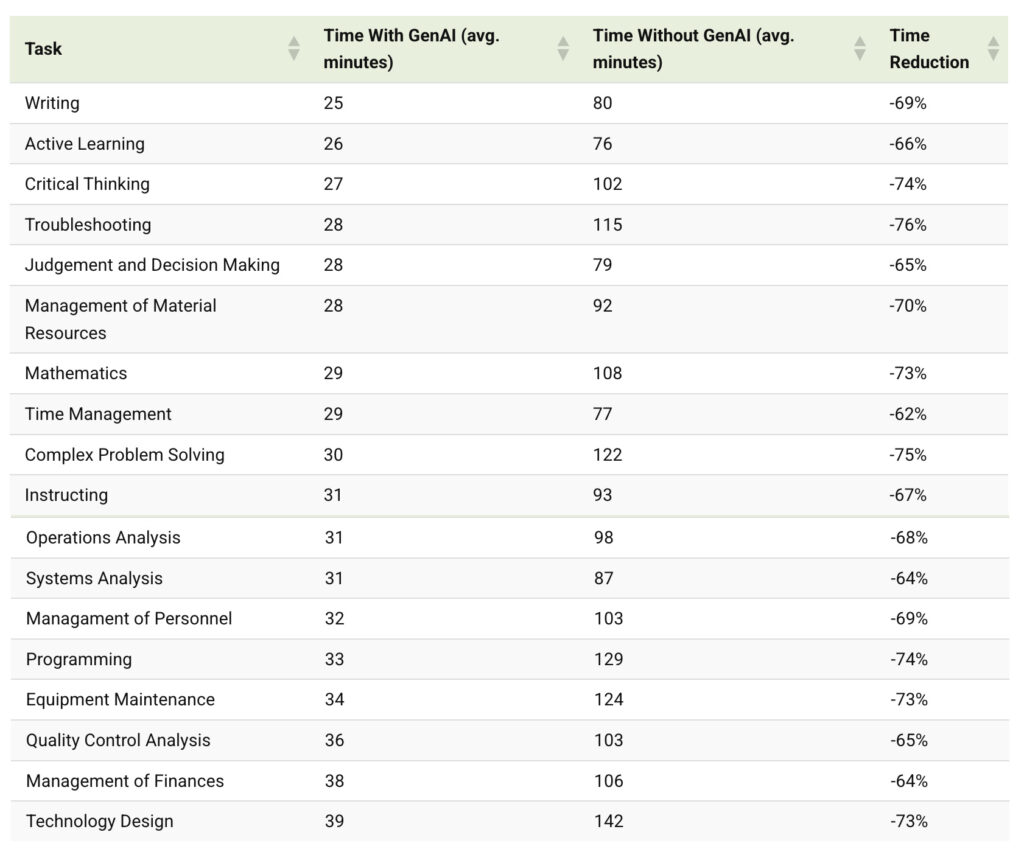Generative AI, referring to artificial intelligence systems capable of creating new content such as text, code, images, or solutions, is increasingly being integrated into professional environments. As adoption grows, its effect on workplace productivity is becoming more tangible and transformative.
A study conducted by Stanford University and the World Bank in late 2024, surveying over 4,000 U.S. adults, revealed that generative AI can reduce the time required to complete typical work tasks by more than 60%. From writing and programming to critical thinking and decision-making, AI tools are significantly accelerating performance across a wide range of roles.
 For instance, writing tasks that traditionally took around 80 minutes were completed in just 25 minutes with AI assistance. Complex problem-solving and troubleshooting saw time reductions of up to 75%, highlighting AI’s strength in handling cognitive and analytical work. Even tasks centred on human judgment and instruction experienced time savings of around 60–70%.
For instance, writing tasks that traditionally took around 80 minutes were completed in just 25 minutes with AI assistance. Complex problem-solving and troubleshooting saw time reductions of up to 75%, highlighting AI’s strength in handling cognitive and analytical work. Even tasks centred on human judgment and instruction experienced time savings of around 60–70%.
These figures indicate that AI is not simply replacing human labour—it is enhancing it. Workers using AI can achieve far more in less time, reshaping workflows and boosting efficiency at scale.
Adoption rates of generative AI are also rising sharply. In just a few months—from December 2024 to March 2025—the proportion of working adults using large language models (LLMs) like ChatGPT rose from 30% to over 43%. If this momentum continues, businesses may soon see AI-enhanced productivity ripple across entire departments and industries.
Looking Ahead: AI in the Next 5–10 Years
Over the next decade, AI is likely to move from being a helpful tool to a core pillar of business operations. Expect to see:
- Standardised AI integration across industries: Much like email or spreadsheets, generative AI may become a foundational tool in most white-collar work.
- Redesigned workflows: Businesses will restructure processes to optimise the human-AI partnership, automating repetitive tasks and allocating human effort to areas requiring empathy, creativity, or leadership.
- AI-powered management and decision systems: Sophisticated AI models will likely assist in forecasting, resource allocation, and strategic planning, making real-time recommendations based on massive datasets.
- Shifts in workforce roles: As AI takes on more technical and operational tasks, demand will rise for roles focused on ethics, oversight, prompt engineering, and systems integration.
- Economic disruption and opportunity: Entire sectors may see productivity booms, while others risk obsolescence without upskilling. Companies that adapt quickly will gain a competitive edge, potentially reshaping industry hierarchies.
Generative AI is not just a trend — it’s a shift in the architecture of how work gets done. The organisations that embrace this change thoughtfully, invest in training, and reimagine their processes will be best positioned to thrive in the AI-enabled economy.










If AI does everything for us then whats the point of us?
Sending this to a friend.
There will be no jobs left. That really sucks the fatty donut.
I just want to say if you are not in at the beginning right now you will miss out. This is gonna be bigger than when the WWW came around.
My law firm are already using AI agents for research purposes on long cases. It is getting kind of scary but it is cutting out a lot of time let’s just say.
AGI when it truly is rolled out global will be massive dude freakin awesome bruh